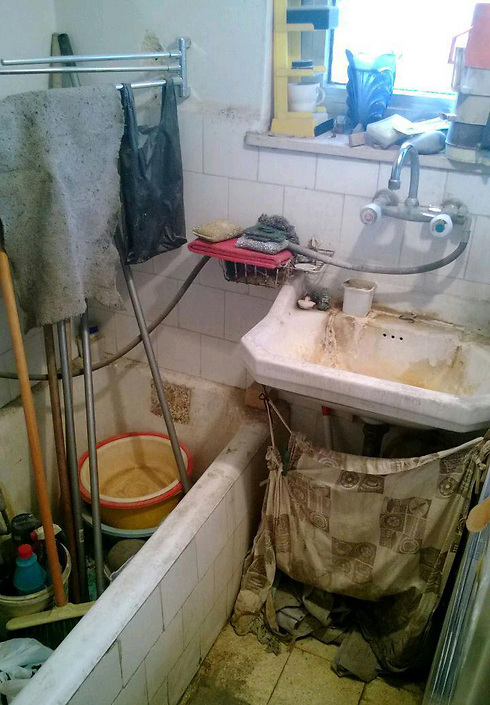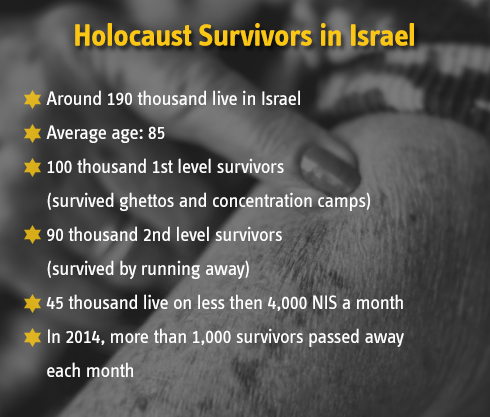
Holocaust survivor Yitzhak Liybeh lives off of NIS 2800 a month.
צילום: אלי מנדלבאום
Thousands of survivors face poverty despite 'unprecedented' plan
Year after NIS billion plan implemented by government, thousands of Holocaust survivors in Israel live in poverty and wait months to receive financial support.
A day before Holocaust Remembrance Day, Ynet took a closer look at the status of Holocaust survivors living in Israel and found that, despite government initiatives, Holocaust survivors are living in a state of poverty and neglect.
Take, for example, Yitzhak Liybeh – a 75 year-old from Romania who lost his two brothers during World War II who lives in Jerusalem. Lonely and disabled, Liybeh has no pension (he worked as an independent plumber) and lives off of NIS 2,800 a month which he receives as part of an old-age pension and income support.
Liybeh is forced to sleep on a fold-out bed in a one-bedroom apartment and collects charity "in order to survive and for food and rent."
Exactly a year ago, a national plan to assist Holocaust survivors was launched with great fanfare. According to the government, the initiative would be an unprecedented investment of NIS one billion a year for five years.
Different sources predicted that, despite the government's claims, the aid per year would be less. These sources estimated that the increase in assistance would be 700 million shekel a year.

Home of Holocaust survivor in Israel. (Photo: Foundation for Benefit of Holocaust Victims in Israel) (באדיבות הקרן לרווחת נפגעי השואה)
A year later, Ynet has found that the reality for many Holocaust survivors is still dismal after failures in implementation of the government plan.
Conversations with dozens of experts in the field, sources from government offices and Holocaust survivors teach that despite the "historic and unprecedented initiative" and despite improvement that was noted for some survivors, there are still a significant amount of cases of Holocaust survivors who have not seen any improvement.

Holocaust survivor's home. (Photo: Foundation for Benefit of Holocaust Victims in Israel) (באדיבות הקרן לרווחת נפגעי השואה)
Many survivors still have appalling living conditions, face poverty, and have difficulty receiving government aid and financial help because of bureaucracy.
A closer look at the cases of thousands of Holocaust survivors shows that the government plan has failed to save tens of thousands of survivors from a life of poverty.
The program sought to mend a historic injustice in which funds that were transferred to the government in Israel's early years still have not reached survivors.
In some cases, the government plan worsened the situation for Holocaust survivors because of amendments to the legislation that enabled tens of thousands of Holocaust survivors to request additional rights and lengthened waiting times for the recognition of their claims to several months – in part because the government workforce assigned to handle the plan did not grow amidst the growing requests sent its way.
The government plan also led to a stop in dental care that had been previously provided to thousands of survivors by the Foundation for the Benefit of Holocaust Victims in Israel.
Many Holocaust survivors found that their financial aid decreased by hundreds to thousands of shekels a month after an extra allowance they received from the Finance Ministry resulted in a cut in funding and aid that they or their spouses received from social security. This was also the case for survivors who received supplementary income – as the two governmental bodies were not coordinated.
This was exactly the case for Silvia Simonovich, who will celebrate her 100th birthday in September. During World War II, Simonovich lived in hiding while her husband was sent to forced labor. Social Security decreased her supplementary income after she received a one-time allowance from the Finance Ministry.
Silvia's daughter Leah says her mother suffers from Osteoporosis that began during World War II. "One arm gives and the other arm takes and in the end you're left empty handed," says Leah. "This results in less hours of care as that is how it's funded."
An online Internet service created by the government to help survivors determine what benefits they are eligible to receive has misinformed several survivors as it only refers to benefits from the Finance Ministry.
For example, if a survivor signifies that they survived by hiding or with a false identity which put their life at risk, they do not get a recommendation to claim article 2 of the Claims Conference (The Conference on Jewish Material Claims Against Germany) which enables them to receive a regular allowance which also include benefits from the Finance Ministry.
A government source who works at one of the ministries entrusted with aiding survivors said: "The bottom line is that this is a very impressive plan with a lot of good intentions with real money that the government has put on the table. It has also led to improvements in a significant amount of cases but the last year has proven that the government did not prepare properly for the program's implementation and that it was too little too late."











